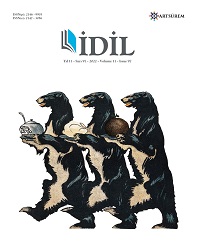FOUCAULT’DA ÖZNENİN YİTİMİNDEKİ NİETZSCHECİ ETKİLER
NIETZSCHEAN INFLUENCES IN THE LOSS OF THE SUBJECT IN FOUCAULT
Author(s): Ufuk BircanSubject(s): Metaphysics, Contemporary Philosophy, Philosophy of History
Published by: Sanat ve Dil Araştırmaları Enstitüsü
Keywords: Genealogy; history; Nietzsche; Foucault; subject;
Summary/Abstract: Michel Foucault rejects an understanding of history based on progress, continuity, objectivity and reason. As a result of the genealogical analysis of history, Foucault claims that each period is shaped around an epistem of its own, as vulnerabilities, unrelated events and emerging arbitrariness. In this study, it is aimed to reveal that Foucault's studies on subject, power and history were influenced by Nietzsche's concept of genealogy and criticism of western metaphysics. Nietzsche's thesis of history has displaced the understanding of subject and truth, which has a central position in western metaphysics. Using the genealogy method, Foucault criticized the search for origins and claimed that the subject-object relationship in the Cartesian philosophy tradition collapsed and lost its value. Nietzsche argues that philosophy, science and moral understanding in rationalist western culture should be reconsidered with the death of God. Since the classical idea of truth disappeared with the death of God, man in the modern epistemology is deprived of all his teleological origin. Foucault by criticizing the understanding of the subject, which is the continuation of the classical idea of truth and built in the 20th century, asserts that modern society does not have an originary bond, and that the individual is assumed to be an identity presented by power.
Journal: İdil Sanat ve Dil Dergisi
- Issue Year: 11/2022
- Issue No: 97
- Page Range: 1279-1286
- Page Count: 8
- Language: Turkish

